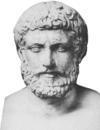- Periander
-
/per'ee an"deuhr/, n.died 585 B.C., tyrant of Corinth.
* * *
died с 587 BCSecond tyrant of Corinth (с 627–587).He was the son of Cypselus, founder of the Cypselid dynasty. One of the most violent of the early Greek tyrants, he killed his wife and avenged the death of his son in Corcyra by sending 300 Corcyran boys to be castrated (they managed to escape). He treated the nobility harshly but built a strong, prosperous Corinthian economy. His extensive building program included construction of the Diolkos, a portage used to transport ships across the Isthmus of Corinth. Periander, marble bust in the Vatican Museum, RomeThe Mansell Collection
Periander, marble bust in the Vatican Museum, RomeThe Mansell Collection* * *
▪ tyrant of Corinthdied c. 588 BCsecond tyrant of Corinth (c. 628–588), a firm and effective ruler who exploited his city's commercial and cultural potential. Much of the ancient Greek representation of Periander as a cruel despot probably derives from the Corinthian nobility, with whom he dealt harshly.Periander was the son of Cypselus, the founder of the Cypselid dynasty of Corinth. To promote and protect Corinthian trade, Periander established colonies at Potidaea in Chalcidice and at Apollonia in Illyria. He conquered Epidaurus and annexed Corcyra. The diolkos (“portage way”) across the Isthmus of Corinth was perhaps built during his reign. It appears that the commercial prosperity of Periander's Corinth became so great that the tolls on goods entering its ports accounted for almost all government revenues. Periander cultivated friendly relations with Thrasybulus, tyrant of Miletus, and maintained ties with the kings of Lydia and Egypt. In the cultural sphere he was a patron of art and of literature; by his invitation the poet Arion came to the city from Lesbos. Sometimes reckoned as one of the Seven Wise Men of Greece, Periander was the supposed author of a collection of maxims in 2,000 verses.* * *
Universalium. 2010.
